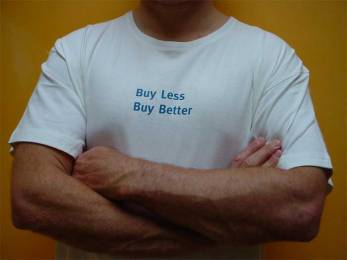
The home, household goods & services
Upmarket mattresses
The Japanese market is seeing a recovery in bed sales with an increasing demand for specialist beds that provide stress relief or deep sleep. And many customers are prepared to pay a great deal more for the assurance of a great night's sleep. One manufacturer has set up a sleep consultation section in one of its showrooms, where customers can test out a bed tailored to their specifics. Their height and weight, along with any sleep problems, are entered into a computer, which adjusts the hardness and springs of the test beds. There's also a strong market for reclining beds. Originally designed for hospitals and nursing homes, demand for the beds now comes not just from the sick or elderly, but also from younger people who wish to read, watch television or use a computer in bed.
Ref: The Nikkei Weekly, 21 August 2006, 'Beds moving upscale as people seek better sleep'. www.nni.nikkei.co.jp
Search words: beds, sleep
Household recycling
The launch of the Ecopod, a household recycling centre, is set to change the way that consumers deal with their waste. The mini-recycling plant is both a compactor and storage unit for recyclable goods. The main use of the recycling centre is processing plastic bottle and aluminium cans - once crushed there is enough room for 50 containers. There are also compartments for storing glass bottles and papers, which can be removed for curbside collection. The unit itself uses no electricity, with the crushing mechanism operated by a foot pedal, so it's even easier for consumers to help the environment. On a slightly related note we hear that the problem of where to locate a household rubbish and recycling plant near Vienna (Austria) has been neatly solved by creating an iconic piece of architecture for the facility that locals have willingly embraced.
Ref: Springwise (Neth), 21 August 2006, 'Household recycling plant'. www.springwise.com
Search words: recycling
Digital homes
The reality of a digital home is still a long way off despite much of the technology needed already existing. For years we have toyed with the idea of a fully networked lifestyle in which TVs, computers, music systems and other appliances could be connected to a central system. Many companies have released products that fit into this dream, but until the cost comes down and the technology becomes easier to use, they will not be in the realm of the average consumer. Another problem is the lack of standards in the industry. Although everyone agrees that interoperability between products is the key, there's been no decision on what the standard should be, with every company racing to release the product that sets the benchmark. Some of these ideas have already been superseded. The concept of an all-in-one controller seemed to be the way of the future for many years but has now given way to the idea of having devices working together over a single network. There's also some debate as to whether a viable market for the technology exists. For some the idea of bringing computers out of the office and into the lounge room could be off-putting. And while they might feel comfortable using them to control the sound system or DVD player, do consumers really want to be using them to turn off the lights or start the coffee machine?
Ref: Red Herring (US), 24 July 2006, 'Dream Home'. www.redherring.com
Search words: electronics, remote control, wireless, smart homes, wired homes
Tunes for your teeth
US toy manufacturer Hasbro has announced the introduction of a musical toothbrush, Tooth Tunes, designed to encourage children to brush their teeth. The product line will have 18 varieties of toothbrush, each with a different tune. The user pushes a button on the brush to start the song clip, which runs for two minutes - the recommended brushing time. The sound waves are actually sent through the teeth, which means children will have to be brushing to hear the tunes, with the sound quality tapering off if they brush incorrectly. While the company insists that it is not a toy, the fun factor gives it an advantage in the market. In the oral hygiene market, children represent the fastest growing sector, needing a new toothbrush every four to six months. And while the Hasbro toothbrushes may cost more than others, the company is confident that the product will sell if it makes children more inclined to brush their teeth.
Ref: USA Today (US), 12 October 2006, 'Got a song stuck in your head? Maybe it's your toothbrush', T. Howard. www.usatoday.com
Search words: toys, toothbrush, music, children
Test-houses
You wouldn't buy a car without taking it for a test drive, but what about a new house? Taking the try-before-you-buy idea to a new market, a New Zealand company is letting potential buyers and their families spend the night in their test homes. The Ruatuna company builds straw houses, and found that the unfamiliar nature of the buildings sparked a lot of questions about what it was like to live in a straw home. The test homes have proved very successful in introducing this niche product to consumers, prompting many to wonder if this form of 'tryvertising' could be useful for marketing other big purchases.
Ref: Springwise (Neth), 7 October 2006, 'Test-sleeping for homebuyers'. www.springwise.com
Search words: homes, tryvertising, trial, testing
